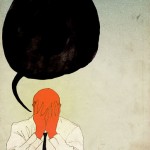Related Posts
No Comments
Kevin F. Adler on November 12, 2012 ·
Martin, this strikes me as a recipe for inauthenticity. While I think the “is this action one I’d be willing to share with others?” is generally a fine moral guide, thinking of whether each action is one I’d share publicly or not leads to broadcasting and self-presentation.
Martin Varsavsky on November 12, 2012 ·
you have a point, but at the same time it is so hard to keep things private, to make sure they will never be exposed, that we are all leading almost public lives whether we like it or not
you see what happened to Petraeus…head of the CIA and can’t keep a secret
Martin Vives on November 17, 2012 ·
What if you don’t agree with the Moral Consensus?
It baffles me to see that cleptocracy is more socially accepted than adultery.
Leave a Comment
You must be logged in to post a comment.






rustlem on November 11, 2012 ·
“everybody wants to be naked and famous” as the song goes.
I had dinner 10 yrs ago with a privacy advocate. I realised after 5 minutes that he was completely wasting his time. Privacy is, at best, a temporary phenomenon. As you said, your email hasn’t been hacked yet, nor required in an e-discovery process. We better get used to the idea that everything we say and do (at least electronically) may come back to haunt us.
And, as you say, we need to change our behaviour. We tell our kids not to say anything about someone that they wouldn’t be prepared to say to the person directly. In practice we’ll act a little better and be a little more forgiving. What we should be worrying about is ensuring equality of access to information. Sure, you can see mine as long as I can see yours.
Martin Varsavsky on November 11, 2012 ·
In 1999 I was hit with the happy99.exe virus. It took all my Word documents, cut parts of those and email them randomly to everyone I knew. Turned out that I kept my private diary in Word. Not that I had major secrets or that I was permanently damaged by this. But it was a warning. No virus hits since then. But still the same principle. Whatever you write, well, anyone may read.